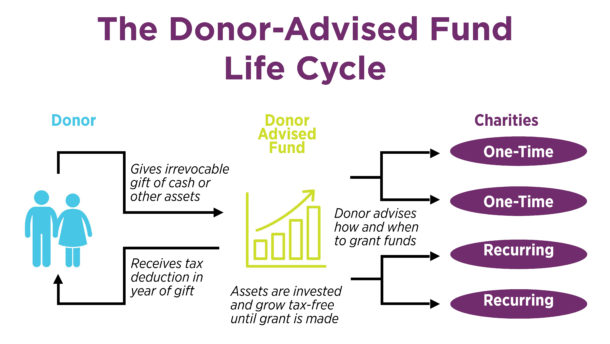The Who and Why of Donor-Advised Funds

‘The proper aim of giving is to put the recipients in a state where they no longer need our gifts.’
-C.S. Lewis
Philanthropy has always been a cornerstone of meaningful impact in society, and through the innovation of donor-advised funds (DAFs), giving has become more accessible and strategic. It represents a powerful means for individuals and organizations to make a meaningful impact on the world. DAFs are the fastest growing charitable giving vehicle in the United States, with more than 1,948,545 donor-advised accounts holding over $228.89 billion in assets.[1]
Essentially, a DAF is a philanthropic fund managed by a third party, typically a financial institution or a community foundation, where donors can contribute assets, receive an immediate tax benefit, and then recommend grants from the fund over time. This model allows donors to strategically plan their giving, engage family members in philanthropic decisions, and support various causes without the complexities of managing a private foundation.
Here are some compelling reasons why potential donors should contemplate the use of a DAF to channel their generosity:
- Simplified Philanthropic Efforts: A DAF serves as a centralized philanthropic account, allowing donors to support various charitable organizations through one entity. This eliminates the hassle of navigating individual donations and tracking.
- Immediate Tax Benefits: Donations to DAFs qualify for immediate tax deductions, making them exceptionally tax-efficient. This feature is particularly attractive for donors seeking to optimize their contributions with beneficial tax incentives.
- Investment Growth Potential: Funds within a DAF can be invested, potentially increasing in value over time. This growth can amplify the donor’s impact without additional out-of-pocket contributions.
- Personalized Timing and Distribution: Donors are not rushed to make funding decisions. They can take their time to thoughtfully choose charitable causes, aligning with their values and priorities.
- Enhanced Privacy Options: For donors who prefer discretion in their giving, DAFs offer the means to donate anonymously, maintaining privacy while still passionately supporting causes.
- Family Philanthropy and Legacy: DAFs encourage the involvement of family in philanthropic endeavors, enabling donors to set a precedent of giving and to include future generations in their philanthropic legacy.

Good candidates for DAFs typically manifest certain characteristics and financial capabilities, such as:
- A Strong Philanthropic Spirit: Ideal candidates are those with a committed passion for giving back and who are actively seeking effective ways to manage their charitable contributions.
- Financial Resources to Give: Individuals who have reached a level of financial stability and are capable of donating sizeable amounts find DAFs particularly valuable, both for impacting their chosen causes and for tax planning.
- Legacy and Succession Planning: People interested in creating a sustained impact through philanthropy, and who wish to engage their families in the process, will benefit from the long-term orientation of DAFs.
- Individuals/Families who are charitably inclined and who seek to reduce tax liability in a high-income year may find the use of DAF’s particularly appealing. With the passage of the Tax Cut and Jobs Act in 2018 the threshold for the standard deduction roughly doubled and deductible limit of AGI increased from 50% to 60%. This creates an environment in which many donors find it advantageous to budget several years of giving in one year to a DAF.
In conclusion, donor-advised funds represent a transformative approach to charitable giving, matching the desires of modern-day philanthropists with the efficiency, flexibility, and structure needed to maximize their impact. For those who resonate with these advantages and possess the financial means to engage, working with an advisor who is experienced in DAFs is vital for maximizing the efficiency and impact of philanthropic efforts. To learn more about DAFs and philanthropic initiatives, contact your local advisor.
The information above is for educational purposes only. Please consult a qualified tax professional prior to implementing any of the strategies discussed.
[1] https://www.nptrust.org/philanthropic-resources/philanthropist/highlights-from-the-2023-daf-report/
